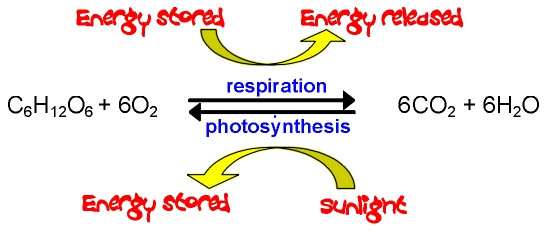Energy and ATP
Without maintenance a building becomes derelict. All things become disordered. Energy input is needed to maintain order
Specifically, energy is needed for:
- Synthesis of complex molecules eg proteins from amino acids
- Active transport (c. 50% of ATP used for this in resting mammal)
- Mechanical work eg muscle contraction, movement of microtubules, cilia, flagella, movement within cells
- Bioluminescence and electrical discharge, eg fireflies, electric eel
- Maintenance of “warm” body temperature
The Importance of Photosynthesis
The source of almost all energy on earth is sunlight.
Living organsisms:
- Convert light energy to (stored) chemical energy
- Build up inorganic Carbon (CO2) into organic molecules (containing Carbon and Hydrogen)
AUTOTROPHS can use inorganic Carbon to build up molecules, those which must use organic C sources are HETEROTROPHS.
Respiration
Respiration is the reverse of photosynthesis - it is the breakdown of organic molecules to release the stored chemical energy for the cell's specific needs.
Energy is stored organically in the form of glucose (C6H12O6) during photosynthesis and released during respiration.

Respiration takes place as a series of small steps for 2 reasons:
- this allows precise control via feedback mechanisms
- it also avoids a sudden release of a lot of energy which would be difficult to harness
Glucose is a stable compound and the high activation energy must be lowered by enzymes and by raising the energy level of glucose by phosphorylation (adding phosphate groups).
